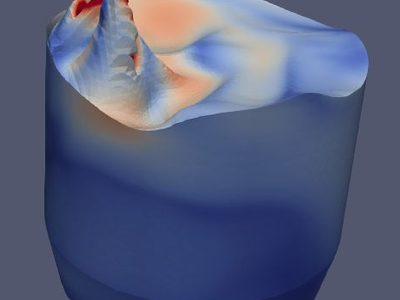- Introduction to simulation methods, limitations and possibilities in general.
- Review of some of the modeling software today.
- Exercises introducing the students to some modeling software, including limitations and possibilities of the specific software.
- Selection and planning of a modeling problem.
- Solution of the modeling problem project.
- Written and oral presentation of the project.
MH2042 Simulation and Modeling Toolbox 6.0 credits

Today a wide variety of simulation tools are available to help with engineering tasks. Numerical solutions of the incredibly complex Navier-Stokes equations have been around for almost a century; in the early 20th century it was performed by human computers and today it can be performed on any desktop computer or on various super computers around the world. In materials processing simulation of steel flows is a very useful tool to aid with process understanding – many of the processes have such an environment that regular experimental methods cannot be used and as such modeling can complement experimental techniques. It is also important to note that problem solving skills and innovation are highly valued in any industry and as such there will be a focus on solving actual industrial problems in this course.
Information for research students about course offerings
Doctoral students who want to follow the course must register for the doctoral level course FMH3923 Fundamental basis for Modelling of Kinetics as well as heat and mass transport in Industrial Processes 6.0 credits.
Choose semester and course offering to see current information and more about the course, such as course syllabus, study period, and application information.
Content and learning outcomes
Course contents
Intended learning outcomes
After the course you should be able to.
- Define and setup a materials process problem using common commercial software.
- Apply the equations of change on materials process problems.
- Interpret the simulation results.
- Have some basic knowledge of the limitations of the software.
- Plan a project and present the results in a scientific manner, both orally and written.
Literature and preparations
Specific prerequisites
In total 165 higher education credits in the main field of study of Technology.
Recommended prerequisites
- Fluid mechanics and heat transport (MH1037 Transport Phenomena or similar)
- Numerical methods (SF1551 Numerical Methods, Basic Course or similar)
Equipment
Literature
Examination and completion
If the course is discontinued, students may request to be examined during the following two academic years.
Grading scale
Examination
- PRO1 - Project Assignment, 4.0 credits, grading scale: A, B, C, D, E, FX, F
- SEM1 - Seminar, 2.0 credits, grading scale: A, B, C, D, E, FX, F
Based on recommendation from KTH’s coordinator for disabilities, the examiner will decide how to adapt an examination for students with documented disability.
The examiner may apply another examination format when re-examining individual students.
Dragon’s Den - Problem Formulation Seminar
During the problem formulation presentation (max 5 minutes!) a few external "venture capitalists" will judge your projects based on your presentations
Important Points:
- Background (including state-of-the-art)
- Goal with project and also time to accomplish the goals.
- Deliverables (some means to show you have achieved the goals).
Opportunity to complete the requirements via supplementary examination
Opportunity to raise an approved grade via renewed examination
Examiner
Ethical approach
- All members of a group are responsible for the group's work.
- In any assessment, every student shall honestly disclose any help received and sources used.
- In an oral assessment, every student shall be able to present and answer questions about the entire assignment and solution.